<Back to Index>
- Bluesman Johnny Shines, 1915
- Bluesman Robert Lockwood, Jr., 1915
- Bluesman John Lee Hooker, 1917
PAGE SPONSOR

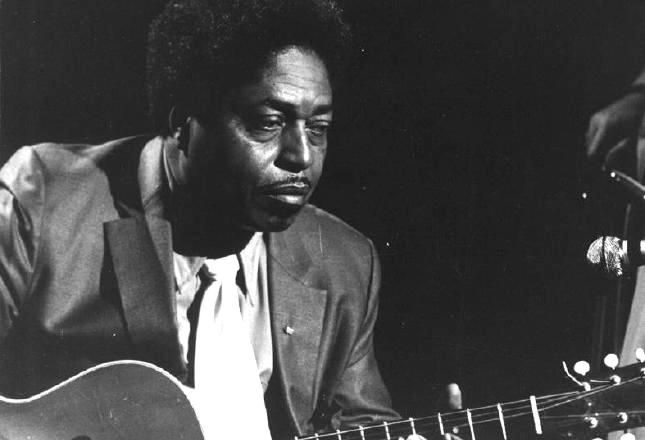
Johnny Shines (April 26, 1915 – April 20, 1992) was an American blues
singer and guitarist. According to the music journalist Tony Russell,
"Shines was that rare being, a blues artist who overcame age and
rustiness to make music that stood up beside the work of his youth. When
Shines came back to the blues in 1965 he was 50, yet his voice had the
leonine power of a dozen years before, when he made records his
reputation was based on".
He was born John Ned Shines in Frayser, Memphis, United States. He spent most of his childhood in Memphis, Tennessee, playing slide guitar at an early age in local “jukes” and for tips on the streets. He was "inspired by the likes of Charley Patton, Blind Lemon Jefferson, Lonnie Johnson, and the young Howlin' Wolf", but he was taught to play the guitar by his mother. Shines moved to Hughes, Arkansas, in 1932 and worked on farms for three years putting his musical career on hold. It was a chance meeting with Robert Johnson, his greatest influence, that gave him the inspiration to return to music. In 1935, Shines began traveling with Johnson, touring the south and heading as far north as Ontario where they appeared on a local radio program. The two went their separate ways in 1937, one year before Johnson's death.
Shines played throughout the southern United States until 1941 when he settled in Chicago. There Shines found work in the construction industry but continued to play in local bars.
He made his first recording in 1946 for Columbia Records, but the takes were never released. He recorded for Chess in 1950, and was once again denied release. He kept playing with local blues musicians in the Chicago area for several more years. In 1952, Shines recorded what is considered his best work for the J.O.B. Records label. The recordings were a commercial failure and Shines, frustrated with the music industry, sold his equipment and returned to construction.
In 1966, Vanguard Records found Shines taking photographs in a Chicago blues club and had him record tracks for the third installment of Chicago / The Blues / Today! The album has since then become a blues classic and it brought Shines into the mainstream music scene.
Shines toured with the Chicago All Stars alongside Lee Jackson, Big Walter Horton and Willie Dixon.
Shines moved to Holt, Alabama, in Tuscaloosa County, in 1969. When a University of Alabama student, Natalie Mattson, learned that he was living in the area, she invited him to play at a coffee house, known as the "Down Under," that she ran on campus. Shines played on several occasions, and also brought his friend, blues artist Mississippi Fred McDowell to appear with him at Down Under. These were some of his earliest appearances in Alabama after his move there. He continued to play the international blues circuit while living in Holt, Alabama.
In the late 1960s and 1970s, Shines toured with Robert Johnson's stepson, Robert Lockwood, Jr. as the last remaining original delta blues musicians. In 1980, Shines' music was brought to a standstill when he suffered a stroke. He would later appear, and play, in the 1991 documentary The Search for Robert Johnson and release one last album, Back To The Country, which won a W.C. Handy Award. It featured playing from Snooky Prior and Johnny Nicholas.
In 1989, Shines met Kent DuChaine, and the two of them toured for the next several years until Shines' death.
Shines died on April 20, 1992, in Tuscaloosa, Alabama. He was inducted into the Blues Hall of Fame later the same year.

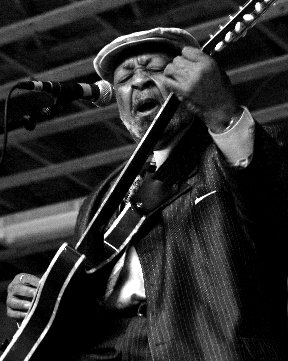
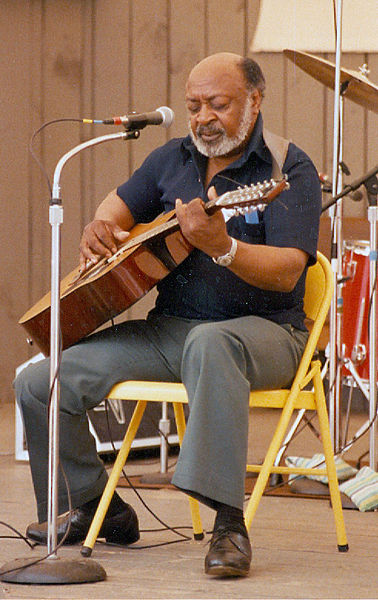
Robert Lockwood, Jr., also known as Robert Junior Lockwood, (March 27, 1915 – November 21, 2006) was an American Delta blues guitarist, who recorded for Chess Records among other Chicago labels in the 1950s and 1960s. He is best known as a longtime collaborator with Sonny Boy Williamson II and for his work in the mid 1950s with Little Walter.
Robert Lockwood was born in Turkey Scratch, a hamlet west of Helena, Arkansas. He started playing the organ in his father's church at the age of 8. The famous bluesman Robert Johnson lived with Lockwood's mother for 10 years off and on after his parents' divorce. Lockwood learned from Johnson not only how to play guitar, but timing and stage presence as well. Because of his personal and professional association with the music of Robert Johnson, he became known as "Robert Junior" Lockwood, a nickname by which he was known among fellow musicians for the rest of his life, although he later frequently professed his dislike for this appellation.
By age 15, Lockwood was playing professionally at parties in the Helena area. He often played with his quasi - stepfather figure, Robert Johnson, also occasionally with Sonny Boy Williamson or Johnny Shines. Lockwood played at fish fries, juke joints, and street corners throughout the Mississippi Delta in the 1930s. An anecdote from Lockwood's website claims on one occasion Robert Johnson played on one side of the Sunflower River, while Lockwood played on the other, with the people of Clarksdale, Mississippi milling about the bridge, supposedly unable to tell which guitarist was the real Robert Johnson.
Lockwood played with Sonny Boy Williamson in the Clarksdale, Mississippi, area in 1938 and 1939. He also played with Howlin' Wolf and others in Memphis, Tennessee, around 1938. From 1939 to 1940 he split his time playing in St. Louis, Missouri, Chicago, Illinois, and Helena.
In 1941, Lockwood made his first recordings with Doctor Clayton for the Bluebird label in Aurora, Illinois. During these same sessions, he also recorded the four songs which were released as the first two singles under his own name, which were early versions of his staple repertoire. These recordings were released as 78s on Bluebird Records.
Also in 1941, Lockwood and Williamson were featured on the first King Biscuit Time radio program on KFFA in Helena. For several years in the early 1940s the pair played together in and around Helena and continued to be associated with King Biscuit Time. From about 1944 to 1949 Lockwood played in West Memphis, Arkansas, St. Louis, Chicago and Memphis. Lockwood was an early influence of B.B. King and played with King's band during his early career in Memphis.
In 1950, Lockwood settled in Chicago. In 1954 he replaced Louis Myers as guitarist in Little Walter's band, and played on Walter's #1 hit "My Babe"
in 1955. He left Little Walter's band shortly thereafter, and in the
late '50s recorded several sessions with Sonny Boy Williamson for Chess Records, sessions which also included Willie Dixon and Otis Spann. Lockwood also performed and / or recorded with Sunnyland Slim, Eddie Boyd, and Muddy Waters among others.
In 1961, Lockwood moved with his wife to her hometown of Cleveland, Ohio, where he resided until his death. In the early 1960s, as "Bob Lockwood, Jr., and Combo," he had a regular gig at Loving's Grill, located at 8426 Hough Avenue. In the 1970s through the 1990s, he performed regularly with his band the "All Stars" at numerous local venues, including Pirate's Cove, The Euclid Tavern, and Peabody's. For the last few years of his career, Lockwood played at Cleveland's Fat Fish Blue (corner of Prospect and Ontario in downtown) every Wednesday night at 8 p.m.; the "All Stars" have continued to perform there after his death.
His Cleveland period also saw the release of some of his most noteworthy studio recordings as a band leader, first with a pair of albums playing solo and with his band of the time on the Trix Records label, and then with Johnny Shines for two LPs on the Rounder label. The latter showed both men determinedly playing the music they were interested in, rather than the familiar requests of the blues audience - an attitude Lockwood maintained. Although he seldom performed without his band, he also recorded a solo album of his own material, along with a few Robert Johnson standards, under the title Plays Robert and Robert. Lockwood has dealt briskly, sometimes brusquely, with the Johnson legend. It's typical that when he gave one of his infrequent album recitals of Johnson songs, for Plays Robert and Robert (1983), he puckishly chose to use a 12 string guitar.
In 2004, Lockwood appeared at Eric Clapton's first Crossroads Guitar Festival in Dallas, Texas. A live recording with three other blues musicians in Dallas in October 2004 – Last of the Great Mississippi Delta Bluesmen: Live In Dallas – was awarded a Grammy for Best Traditional Blues Album. or Henry Townsend and Robert Lockwood Jr. It was the first Grammy win for the musicians. His last known recording session was carried out at Ante Up Audio studios in Cleveland; where he performed on the album The Way Things Go, with long time collaborator Cleveland Fats for Honeybee Entertainment.
Lockwood died at the age of 91 in Cleveland, having earlier suffered a cerebral aneurysm and a stroke. He is buried at Riverside Cemetery in Cleveland.
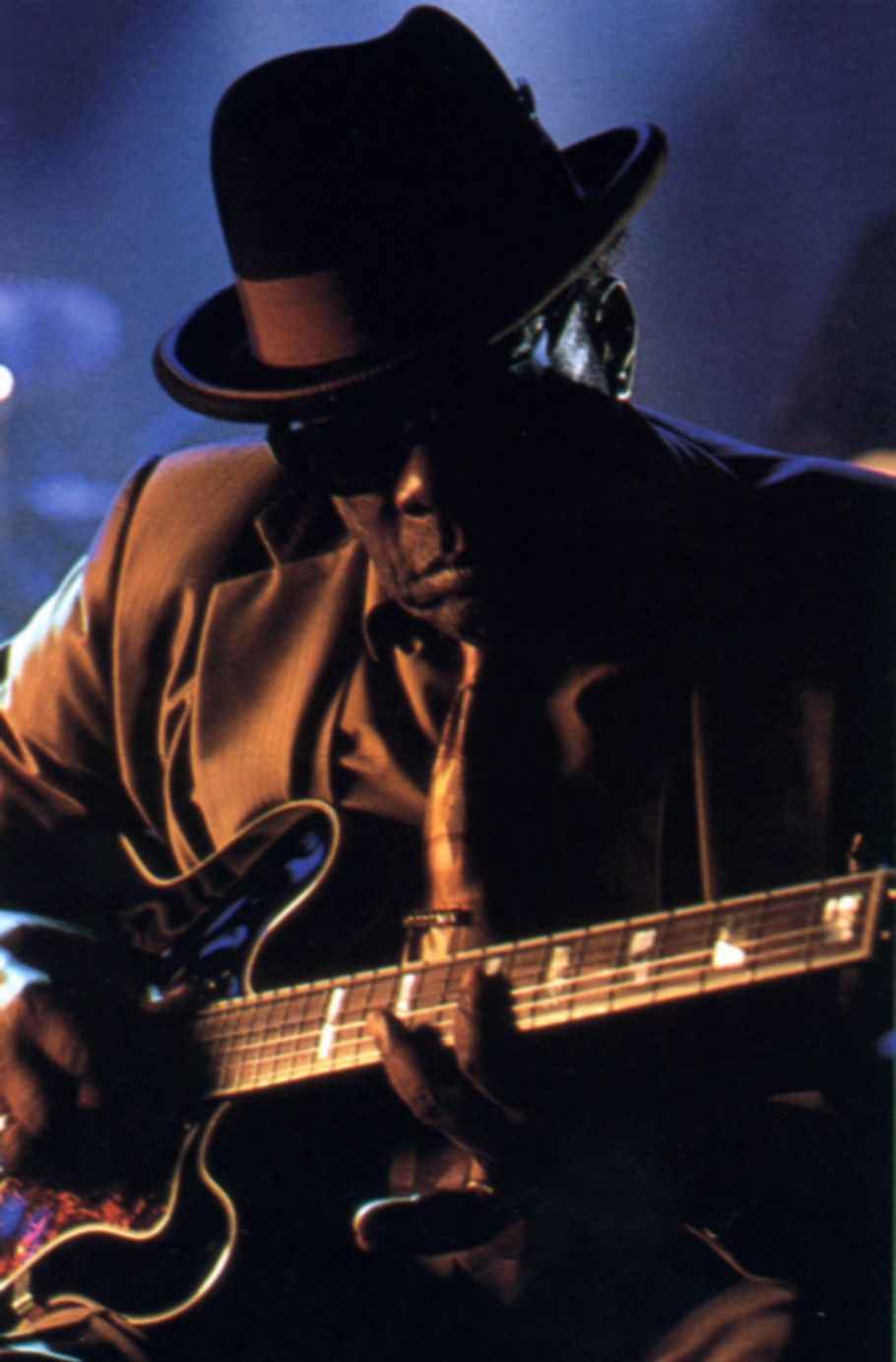
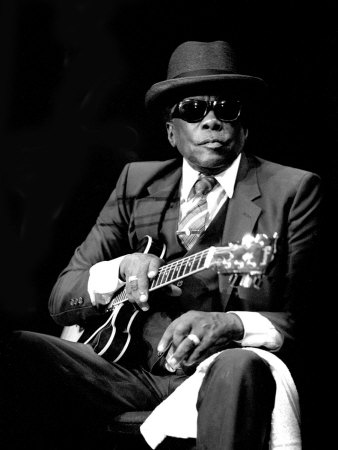
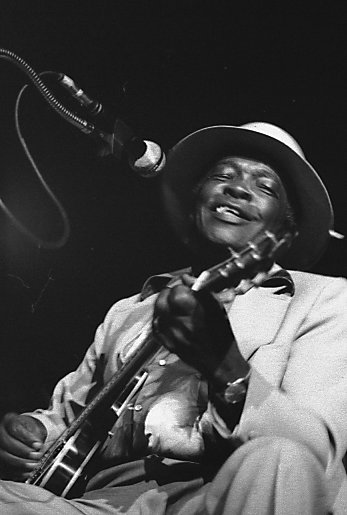
John Lee Hooker (August 22, 1917 – June 21, 2001) was a highly influential American blues singer - songwriter and guitarist.
Hooker began his life as the son of a sharecropper, William Hooker, and rose to prominence performing his own unique style of what was originally a unique brand of country blues. He developed a 'talking blues'
style that was his trademark. Though similar to the early Delta blues,
his music was metrically free. John Lee Hooker could be said to embody
his own unique genre of the blues, often incorporating the boogie - woogie piano style and a driving rhythm into his blues guitar playing and singing. His best known songs include "Boogie Chillen'" (1948), "I'm in the Mood" (1951) and "Boom Boom" (1962), the first two reaching R&B #1 in the Billboard charts.
There is some debate as to the year of Hooker's birth in Coahoma County, Mississippi, the youngest of the eleven children of William Hooker (1871 – 1923), a sharecropper and Baptist preacher, and Minnie Ramsey (born 1875, date of death unknown); according to his official website, he was born on August 22, 1917.
Hooker and his siblings were home schooled. They were permitted to listen only to religious songs, with his earliest exposure being the spirituals sung in church. In 1921, his parents separated. The next year, his mother married William Moore, a blues singer who provided Hooker with his first introduction to the guitar (and whom John would later credit for his distinctive playing style). John's stepfather was his first outstanding blues influence.William Moore was a local blues guitarist who learned in Shreveport, Louisiana, to play a droning, one - chord blues that was strikingly different from the Delta blues of the time. Around 1923 his natural father died. At the age of 15, John Lee Hooker ran away from home, reportedly never seeing his mother or stepfather again.
Throughout the 1930s, Hooker lived in Memphis, Tennessee, where he worked on Beale Street at The New Daisy Theatre and occasionally performed at house parties.
He worked in factories in various cities during World War II, drifting
until he found himself in Detroit in 1948 working at Ford Motor Company.
He felt right at home near the blues venues and saloons on Hastings
Street, the heart of black entertainment on Detroit's east side. In a
city noted for its pianists, guitar players were scarce. Performing in
Detroit clubs, his popularity grew quickly and, seeking a louder
instrument than his crude acoustic guitar, he bought his first electric
guitar.
Hooker's recording career began in 1948 when his agent placed a demo, made by Hooker, with the Bihari brothers, owners of the Modern Records label. The company initially released an up-tempo number, "Boogie Chillen'", which became Hooker's first hit single. Though they were not songwriters, the Biharis often purchased or claimed co-authorship of songs that appeared on their labels, thus securing songwriting royalties for themselves, in addition to their own streams of income.
Sometimes these songs were older tunes which Hooker renamed, as with B.B. King's "Rock Me Baby", anonymous jams "B.B.'s Boogie" or songs by employees (bandleader Vince Weaver). The Biharis used a number of pseudonyms for songwriting credits: Jules was credited as Jules Taub; Joe as Joe Josea; and Sam as Sam Ling. One song by John Lee Hooker, "Down Child" is solely credited to "Taub", with Hooker receiving no credit for the song whatsoever. Another, "Turn Over a New Leaf" is credited to Hooker and "Ling".
In 1949, Hooker was recorded whilst performing in an informal setting for Detroit jazz enthusiasts, his repertoire included down - home and spiritual tunes which he would not record commercially. The recorded set has been made available in the album "Jack O'Diamonds".
Despite being illiterate, Hooker was a prolific lyricist. In addition to adapting the occasionally traditional blues lyric (such as "if I was chief of police, I would run her right out of town"), he freely invented many of his songs from scratch. Recording studios in the 1950s rarely paid black musicians more than a pittance, so Hooker would spend the night wandering from studio to studio, coming up with new songs or variations on his songs for each studio. Because of his recording contract, he would record these songs under obvious pseudonyms such as John Lee Booker, notably for Chess Records and Chance Records in 1951 / 52, as Johnny Lee for De Luxe Records in 1953 / 54 as John Lee, and even John Lee Cooker, or as Texas Slim, Delta John, Birmingham Sam and his Magic Guitar, Johnny Williams, or The Boogie Man.
His early solo songs were recorded under Bernie Besman. John Lee
Hooker rarely played on a standard beat, changing tempo to fit the needs
of the song. This often made it difficult to use backing musicians who
were not accustomed to Hooker's musical vagaries. As a result, Besman
would record Hooker, in addition to playing guitar and singing, stomping
along with the music on a wooden pallet. For much of this time period he recorded and toured with Eddie Kirkland, who was still performing as of 2008. Later sessions for the VeeJay label in Chicago used studio musicians on most of his recordings, including Eddie Taylor,
who could handle his musical idiosyncrasies very well. His biggest UK
hit, "Boom Boom", (originally released on VeeJay) was recorded with a
horn section.
He appeared and sang in the 1980 movie The Blues Brothers. Due to Hooker's improvisational style, his performance was filmed and sound recorded live at the scene at Chicago's Maxwell Street Market, in contrast to the usual "playback" technique used in most film musicals. Hooker was also a direct influence in the look of John Belushi's character Jake Blues.
In 1989, he joined with a number of musicians, including Carlos Santana and Bonnie Raitt to record The Healer, for which he and Santana won a Grammy Award. Hooker recorded several songs with Van Morrison, including "Never Get Out of These Blues Alive", "The Healing Game" and "I Cover the Waterfront". He also appeared on stage with Van Morrison several times, some of which was released on the live album A Night in San Francisco. The same year he appeared as the title character on Pete Townshend's The Iron Man: A Musical.
Hooker recorded over 100 albums. He lived the last years of his life in Long Beach, California. In 1997, he opened a nightclub in San Francisco's Fillmore District called "John Lee Hooker's Boom Boom Room", after one of his hits.
He fell ill just before a tour of Europe in 2001 and died on June 21 at the age of 83, two months before his 84th birthday. His last live in the studio recording on guitar and vocal was of a song he wrote with Pete Sears called "Elizebeth", featuring members of his "Coast to Coast Blues Band" with Sears on piano. It was recorded on January 14, 1998 at Bayview Studios in Richmond, California. The last song Hooker recorded before his death was "Ali D'Oro", a collaboration with the Italian soul singer Zucchero, in which Hooker sang the chorus "I lay down with an angel". He was survived by eight children, nineteen grandchildren, eighteen great - grandchildren, a nephew, and fiance Sidora Dazi. One of his children is the musician John Lee Hooker, Jr.
Among his many awards, Hooker has a star on the Hollywood Walk of Fame and in 1991 he was inducted into the Rock and Roll Hall of Fame. Two of his songs, "Boogie Chillen" and "Boom Boom" were included in the list of The Rock and Roll Hall of Fame's 500 Songs that Shaped Rock and Roll. "Boogie Chillen" was included as one of the Songs of the Century. He was also inducted in 1980 into the Blues Hall of Fame. In 2000, Hooker was awarded the Grammy Lifetime Achievement Award.
Hooker's guitar playing is closely aligned with piano boogie - woogie. He would play the walking bass pattern with his thumb, stopping to emphasize the end of a line with a series of trills, done by rapid hammer - ons and pull - offs. The songs that most epitomize his early sound are "Boogie Chillen", about being 17 and wanting to go out to dance at the Boogie clubs, "Baby, Please Don't Go", a blues standard first recorded by Big Joe Williams, and "Tupelo Blues", a stunningly sad song about the flooding of Tupelo, Mississippi, in April 1936.
He maintained a solo career, popular with blues and folk music fans of the early 1960s and crossed over to white audiences, giving an early opportunity to the young Bob Dylan. As he got older, he added more and more people to his band, changing his live show from simply Hooker with his guitar to a large band, with Hooker singing.
His vocal phrasing was less closely tied to specific bars than most blues singers. This casual, rambling style had been gradually diminishing with the onset of electric blues bands from Chicago but, even when not playing solo, Hooker retained it in his sound.
Though Hooker lived in Detroit during most of his career, he is not associated with the Chicago style blues prevalent in large northern cities, as much as he is with the southern rural blues styles, known as delta blues, country blues, folk blues, or "front porch blues". His use of an electric guitar tied together the Delta blues with the emerging post - war electric blues.
His songs have been covered by Buddy Guy, Cream, AC/DC, ZZ Top, Led Zeppelin, Tom Jones, Jimi Hendrix, Eric Clapton, Nick Cave & The Bad Seeds, Van Morrison, The Yardbirds, The Animals, The Doors, The White Stripes, MC5, George Thorogood, R.L. Burnside, The J. Geils Band, The Gories, Cat Power, and The Jon Spencer Blues Explosion.